Rada 403. Who passes laws now?
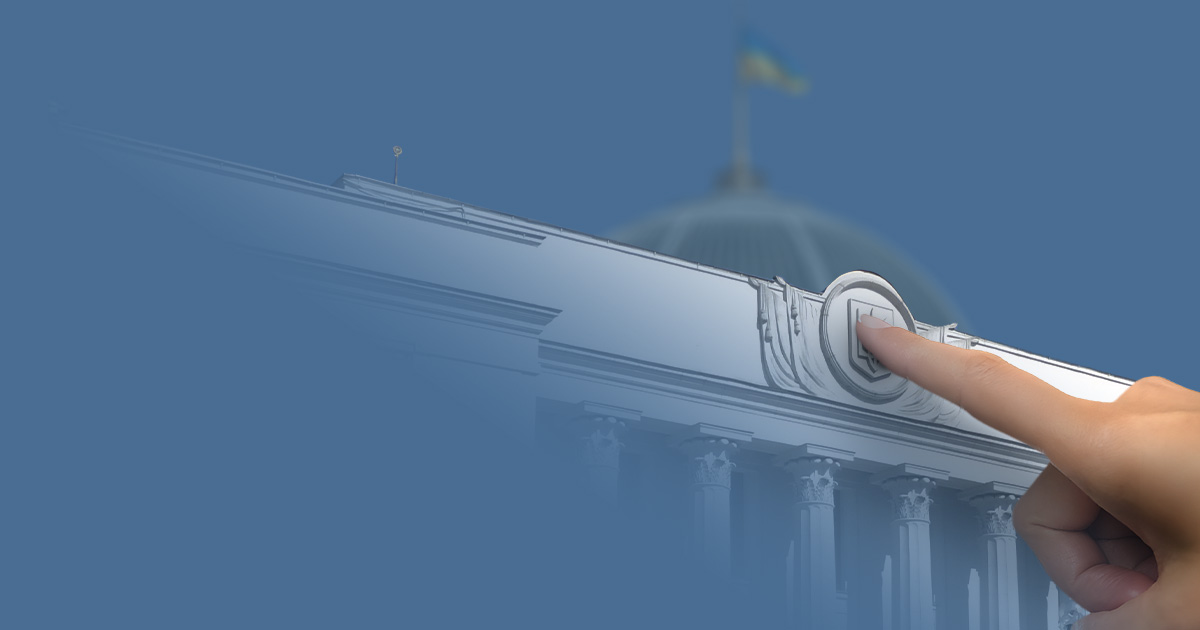
As of November 2023, the Verkhovna Rada has the smallest number of People's Deputies in the history of Ukraine: 403 out of 450 seats are filled. The members of the Verkhovna Rada were elected during early elections in 2019, but since then, the composition has changed.
Despite the changes, some people, such as representatives of the Platforma za zhyttia (Platform for Life), are still deputies who pass laws. Along with them, most of the people involved in the most high-profile scandals of 2023 still have their seats: Anatolii Hunko, who was caught on a bribe; Liudmyla Marchenko, who was throwing a bribe over the fence when detectives came to her house; Mykola Tyshchenko, Bohdan Torokhtii and Oleksandr Dubinskyi, who returned from Thailand, the UAE and Spain, respectively.
Nearly 50 deputies lost their mandates, and new ones took their place. It is, therefore, difficult to keep track of all the movements. This article gathers all the information on who left, who stayed and how this affects legislation.
The Verkhovna Rada and martial law
During the full-scale war, the Verkhovna Rada operates under a closed regime: plenary sessions and the agenda are not announced in advance, journalists are not allowed to enter the Rada, and there are no live broadcasts. The main source of real-time information is the broadcasts of Oleksii Honcharenko (Yevropeiska Solidarnist /European Solidarity) and Yaroslav Zhelezniak (Holos/Voice).

Photo: screenshot of the plenary session broadcast on Tik-Tok by MP Oleksii Honcharenko / Svidomi
Photo: screenshot of the plenary session agenda on the Telegram channel by Yaroslav Zhelezniak / Svidomi
The personal pages of people's deputies on the Verkhovna Rada website, containing information on their attendance at meetings and voting, were also closed. Access to the pages was restored only in August 2023.
After February 24, 2022, some deputies joined the army or have been engaged in volunteering. Serhii Rudyk (Za Maibutnie/For the Future), Roman Lozynskyi (Holos) and Roman Kostenko (Holos) joined the Defence Forces. Volodymyr Viatrovych (Yevropeiska Solidarnist) and Yegor Cherniev (Sluha Narodu/Servant of the People) joined the territorial defence forces.
Roman Hryshchuk (Sluha Narodu) organised the Solomianski Kotyky charity fund, and Yana Zinkevych (Yevropeiska Solidarnist) runs the Hospitallers medical battalion.
Mykhailo Zabrodskyi (Yevropeiska Solidarnist) is a Lieutenant General in the Armed Forces of Ukraine who resigned his parliamentary mandate to focus on military service.
New coalitions
The number of people's deputies has reached an all-time low because, under martial law, most deputies and representatives of the OPZZh cannot be replaced — this requires mid-term elections.
Oleksii Koshel, head of the Committee of Voters of Ukraine, and Oleksandr Salizhenko, parliamentary analyst for the Chesno movement, says in a commentary for Svidomi that this number of deputies does not affect decision-making as voting continues. Even if there is not 100% attendance, this does not affect the legitimacy of decisions, as laws are passed with the constitutional majority — 300 out of 450 deputies.
There are no formal coalitions in parliament, as the Sluha Narodu party has 235 deputies. They retain a mono-majority, as 226 votes are required to pass bills at first reading.
However, not all People's Deputies attend sessions in good faith. Voting shows informal support for the parliamentary majority from other parliamentary groups.
A study by the Chesno movement showed that 9% of Rada's votes since the beginning of 2022 were only adopted because of the support of the ex-Opposition Platforma za zhyttia ta myr (Platform for Life), which is 257 decisions.
In an interview with NV, the head of the Sluha Narodu party, Olena Shuliak, said, "representatives of the Opposition Platforma za zhyttia work efficiently and support all the initiatives of the mono-majority." She talked about those who work in the Committee on the Organisation of State Power, Local Self-Government, Regional Development and Urban Planning.
"The assumption of political barter is logical — 'we don't touch you, you vote as we want'. The scandalous urban planning "reform" (draft law No. 5655) was voted for by 228 deputies, 20 of whom were former members of the Opposition Platforma za zhyttia, and their votes were decisive," Andrii Klymenko, head of the communications department of the Chesno movement, explained to Svidomi.
Since the last parliamentary elections, the Holos faction and party have changed. In 2020, Sviatoslav Vakarchuk, the party's chairman, resigned his parliamentary mandate. Instead, Kira Rudyk took over as the party's leader. In 2021, the party split: one group was led by Rudyk, and the breakaway group was led by Oleksandra Ustinova, who became the head of the faction instead of Yaroslav Zhelezniak. The party under Rudyk's leadership called it a "raider seizure of the faction with the direct intervention of the President's Office".
Chesno analyst Oleksandr Salizhenko says that the fact that the newly appointed Defence Minister Rustem Umerov used to be a deputy of the Voice faction. Eleven people's deputies from the current convocation have been assigned to ministerial positions, and Umerov is the only representative who does not belong to the Sluha Narodu party.
"He was appointed to a position in the executive branch of government, considered a coalition practice in classical political science. But there is no such thing in the parliament as the Voice voting systematically together with the Sluha Narodu," the parliamentary analyst comments.
Oleksii Koshel, chairman of the Committee of Voters of Ukraine, also says that, based on the voting results, there are no grounds to classify Holos as a pro-government faction. He calls the Dovira (Trust) and Za Maibutnie parliamentary groups allies of the mono-majority.
The subjectivity of the Parliament
The Committee of Voters of Ukraine notes that under martial law, the Verkhovna Rada has increased the pace of its work. Despite some debates between political factions, the parliament is working more smoothly than before.
"Studies have shown that after the start of the full-scale invasion, about one in four bills was passed by a constitutional majority. On average, in 2022-2023, the number of bills passed increased by 30%," says Koshel.
He attributes the increase in number of bills passed to unity in support of the Armed Forces. These legislative decisions often take a long time. For example, in one decision, the parliament supports the duty-free import of spare parts for drones, and in another, it votes for the duty-free import of other items for the army — it would be reasonable to merge them.
Oleksii Koshel notes that similar trends were observed in 2015. He suggests that the PR component plays a role for many politicians who want to register bills to support the army.
Oleksandr Salizhenko says there are reasonable grounds for the parliament to lose some of its subjectivity, as the state is living under martial law, and the focus of the bills has shifted to supporting and defending the army.
Whereas the Verkhovna Rada used to be a platform for discussions, now it is not a classic plenary week but several monthly meetings during which deputies gather, vote and leave.
"We did research and saw that there is no such distortion when the bills submitted by the president come first. Deputies and specialised committees of the Verkhovna Rada authored most of the initiatives that became laws last year. Bills submitted by the Cabinet of Ministers came second. Therefore, from this point of view, the parliament is still subjective," explains the parliamentary analyst of the Chesno movement.
How has the Verkhovna Rada changed?
Immediately after the 2019 parliamentary elections, the structure of the Verkhovna Rada was as follows:
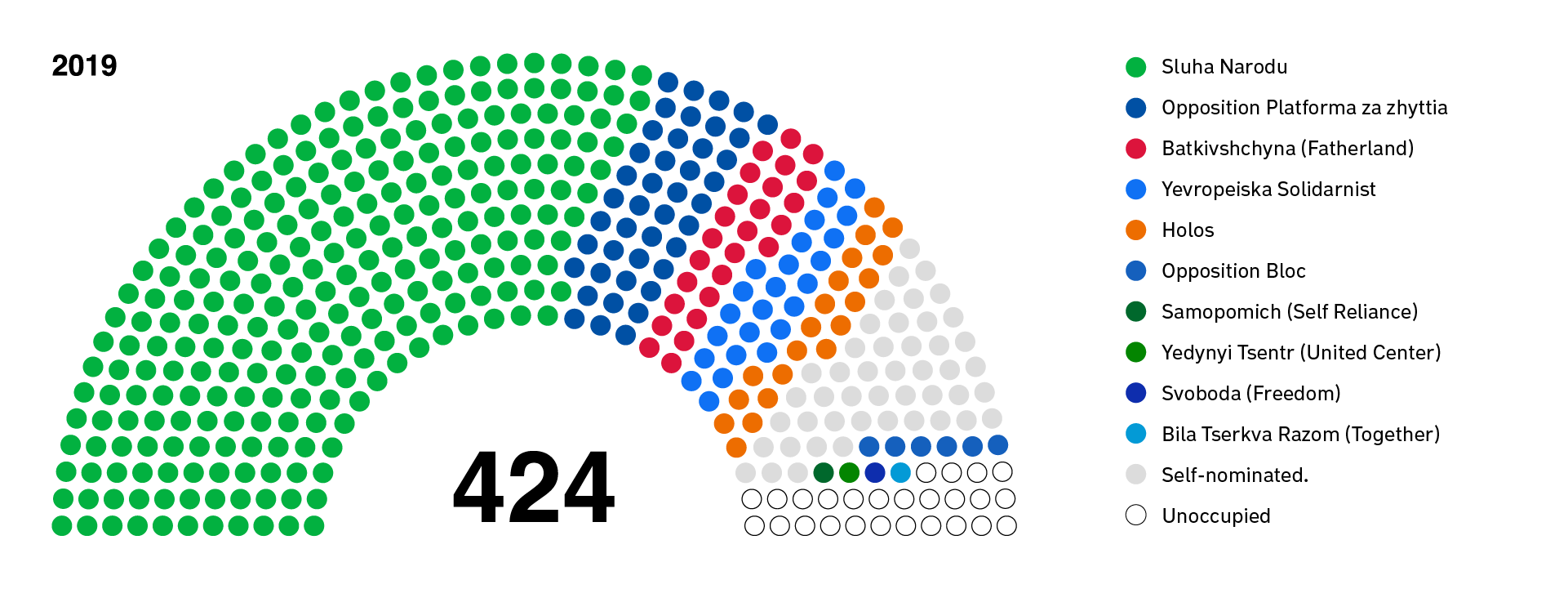
Twenty-six positions remain unoccupied because elections did not occur in the temporarily occupied Crimea and parts of the Donetsk and Luhansk regions.
As of November 2023, the Verkhovna Rada looks like this. It currently has 403 members:
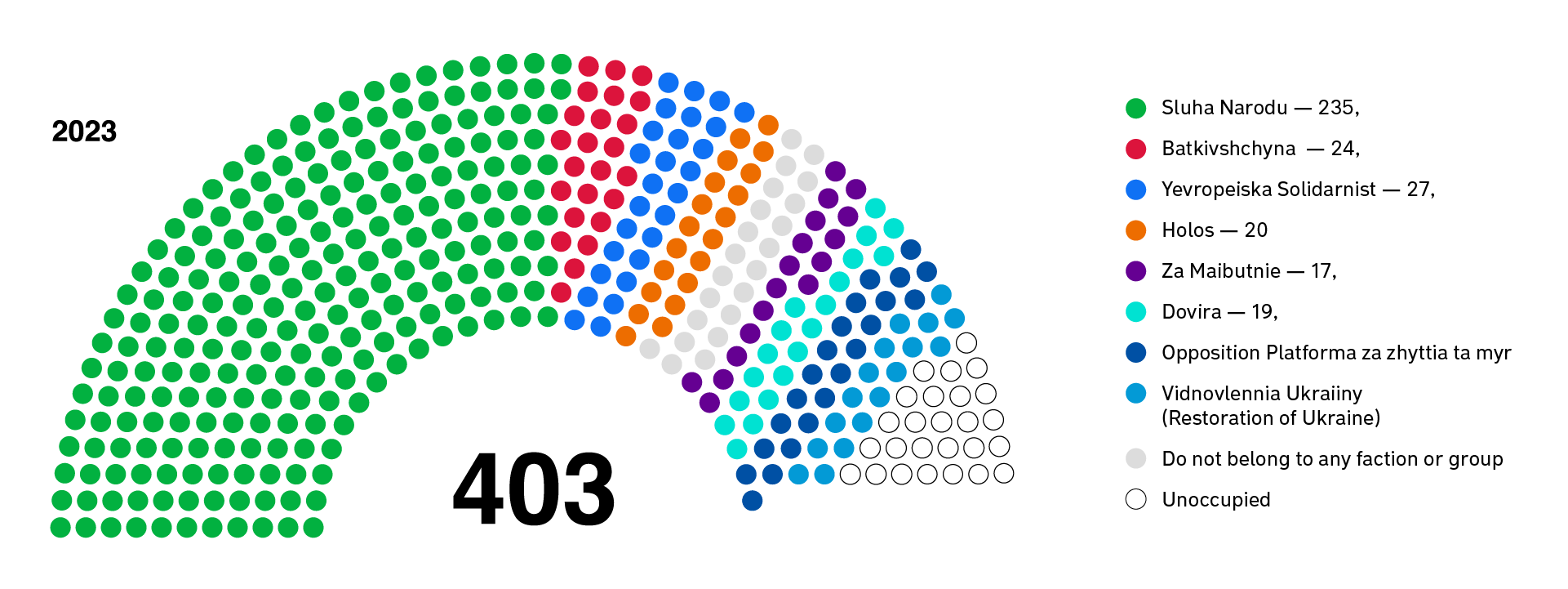
Since the beginning of the work of the Verkhovna Rada of the IX convocation, 48 deputies have left the Parliament.
Deputies who have changed jobs
Being а deputy often opens up career opportunities, especially when they are members of the presidential party.
For example, on their first day in parliament, Mykhailo Fedorov, Denys Maliuska, Vladyslav Kryklii, Oleksii Orzhel, and Hanna Novosad were promoted to the Cabinet of Ministers. In total, eleven deputies from the new convocation became ministers.
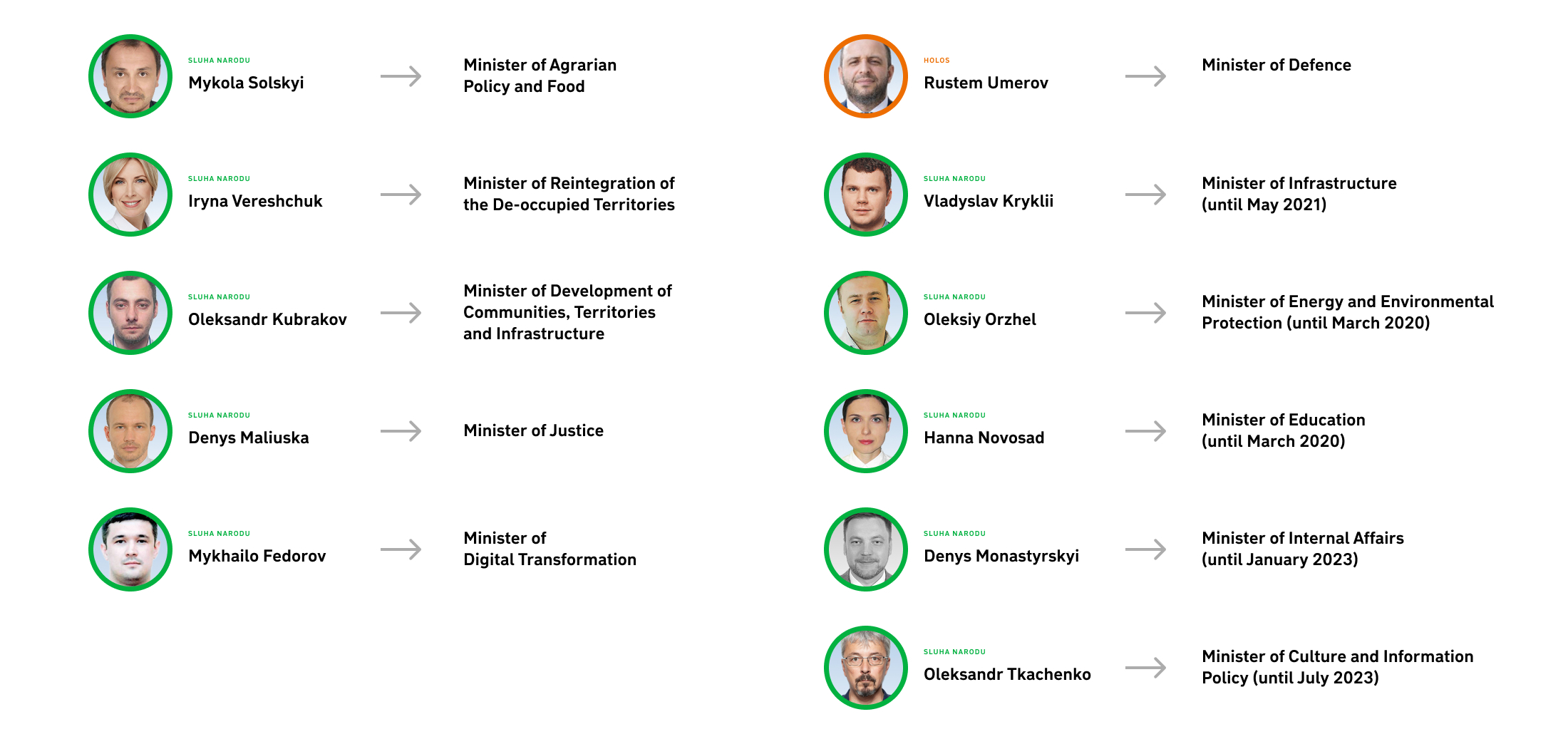
Anna Kovalenko (Sluha Narodu) joined the President's Office at the beginning of her term and became the deputy of Andrii Bohdan, the first head of the Office of President Volodymyr Zelenskyy. After 2020, she was Deputy Minister of Development of Communities and Territories of Ukraine and then headed the Chernihiv Regional State Administration.
Kovalenko was one of many to move to city government. A year after the parliamentary elections, Ihor Kolykhaiev (Za Maibutnie) was elected mayor of Kherson, Zinovii Andriiovych (Sluha Narodu) was elected mayor of Nadvirna, and Ruslan Trebushkin (Sluha Narodu) was elected mayor of Pokrovsk.
The President appointed Oleksandr Skichko (Sluha Narodu) as the head of the Cherkasy Regional State Administration and Oleksii Kucher (Sluha Narodu) as the head of the Kharkiv Regional State Administration.
Iryna Venediktova (Sluha Narodu) was appointed Prosecutor General. In July 2022, her fellow party member, Andrii Kostin, took over the post.
Olha Sovhyria (Sluha Narodu) became a judge of the Constitutional Court. A new competition to the CCU is underway, with Sluha Narodu deputies Oleksandr Kopylenko and Pavlo Pavlish applying for the position. The DEJURE NGO emphasises that this violates the Constitution's requirement for the political independence of judges.
In July 2022, Dmytro Lubinets (self-nominated) became the Verkhovna Rada Commissioner for Human Rights.
Collaborating deputies
Six deputies were deprived of their mandate due to the termination of their citizenship. These are Vadym Rabinovych, Taras Kozak, Renat Kuzmin, Viktor Medvedchuk (PZZhM), Andrii Derkach (unaffiliated) and Ihor Vasylkovskyi (Sluha Narodu).
Oleksiy Kovalov, a collaborator of the Sluha Narodu, was shot dead by Russians at his home in the temporarily occupied territory on August 28, 2022. The Verkhovna Rada posthumously revoked his mandate.
Deputies who died
On September 25, 2023, self-nominated Deputy Andrii Ivanchuk died. According to Ukrainska Pravda, the cause of death was a blood clot.
In 2020, non-factional Deputy Valerii Davydenko was found dead with a gunshot wound to the head in his office. The main investigative version was suicide, but a colleague from the Dovira parliamentary group, Serhii Shakhov, claimed murder.
In 2021, Anton Poliakov, a People's Deputy who ran as a candidate for the Sluha Narodu party and later left the faction, also died. An examination showed alcohol, methadone and dimedrol in his blood. His fiancée, People's Deputy Anna Skorokhod, stated that Poliakov had never used drugs and that the cause of his death was murder by strangulation.
Criminal proceedings or suspicions of crimes
In 2021, Oleksandr Trukhin, a Deputy of the Sluha Narodu party, had an accident and offered a bribe to police officers to "quietly withdraw". On February 22, 2023, he made a deal with the investigation and pleaded guilty. Trukhin pledged to pay a fine of 68,000 hryvnias and transfer six million to the Drone Army. On February 23, the Verkhovna Rada terminated his powers.
Yurii Aristov (Sluha Narodu) resigned in July 2023 after Slidstvo.info journalists discovered that the People's Deputy had been on holiday in the Maldives during the full-scale war.
Andrii Aksonov joined the Rada in 2021 when he won the by-election in the 50th district in the Donetsk region. They were held because Ruslan Trebushkin, a deputy from this district, became the mayor of Pokrovsk. Aksonov wrote a letter of resignation in January 2023. In 2014, he supported illegal pseudo-referendums in the Donetsk region. Journalists and former deputy Dmytro Lubinets also reported that Aksonov has a Russian passport.
Andrii Kholodov (Sluha Narodu) wrote a resignation letter in July 2023. Before that, Skhemy journalists found out that Kholodov had left Ukraine 12 times during the full-scale war and had not returned or attended meetings since January.
Resigned for personal reasons
On November 22, 2023, Vitalii Danilov, a member of the Batkivshchyna party, resigned his seat. People's Deputy Yaroslav Zhelezniak said the vote on the Deputy's resignation would be held on December 8.
At the same time, they may vote to terminate the deputy powers of Maksym Yefimov, a majoritarian from the Kramatorsk constituency. He wrote on Facebook that he would resign because he focused on preserving the frontline city's industrial and economic potential. Yefimov is a co-chair of the Restoring Ukraine parliamentary group.
Olha Bielkova (Batkivshchyna) resigned in June 2020 and became the Director of Government and International Affairs at Ukraine's Gas Transmission System Operator.
Former Prosecutor General Yurii Lutsenko said in an interview with Bukvy that his wife resigned from the parliament in 2019 due to health problems and a stroke. Instead of Iryna Lutsenko, Volodymyr Viatrovych received a mandate from the Yevropeiska Solidarnist Party.
Which OPZZh members are still in the Rada?
After the 2019 elections, the party came second and won 44 seats in the parliament.
On March 15, 2022, the Rada deprived Illia Kyva of his mandate — he submitted his resignation. Kyva went into hiding in Russia. The Lychakiv District Court of Lviv found him guilty of treason in absentia and sentenced him to 14 years.
On March 19, 2022, the National Security and Defence Council banned the Opposition Platforma za zhyttia's activities during martial law. At the end of March of the same year, the party announced that it had ceased operations.
Currently, 33 deputies from the PZZhM remain in the Rada. They formed the Platforma za zhyttia ta myr group, which includes 25 MPs from the Opposition Platforma za zhyttia. Yurii Boiko heads the group. It currently has 22 deputies.
In July 2022, Yurii Pavlenko joined the group after being a non-factional member for several months. In late November, Yuliia Liovochkina resigned "due to family reasons". In 2023, Nataliia Korolevska, Yurii Solod and Oleh Voloshyn withdrew their mandates and skipped meetings.
In the second half of May 2022, the Rada created a parliamentary group, Restoration of Ukraine, which included 12 former members of the Opposition Platforma za zhyttia. Ihor Abramovych, its co-chair, resigned his mandate in February 2023. In July, Tetiana Plachkova also withdrew her mandate.
Fedir Khrystenko of the Opposition Platforma za zhyttia remains unaffiliated.
Read more about the activities of the Opposition Platforma za zhyttia and the parliamentary groups formed from them in the article "They are still here: why is the Opposition Platforma za zhyttia still in power?"
On March 19, 2022, the National Security and Defence Council suspended the activities of the Opposition Bloc. Vadym Novynskyi and Dmytro Shentsev, whom the party had nominated, resigned their seats of their own free will. The NSDC imposed sanctions on Novynskyi, and the SSU seized his property.
Who took the vacant seats?
Twenty-eight people's deputies accepted mandates after their colleagues resigned from the Rada. Those next on the party lists in the elections receive the mandate. For the majority constituencies to be elected to the Verkhovna Rada, interim elections must be held there. Thus, in 2020, Yuliia Svitlychna was elected as a People's Deputy in the Kharkiv region, and in 2021, Vasyl Virastiuk was elected in the Ivano-Frankivsk region. Such elections cannot be held under martial law, so the seats remain available.
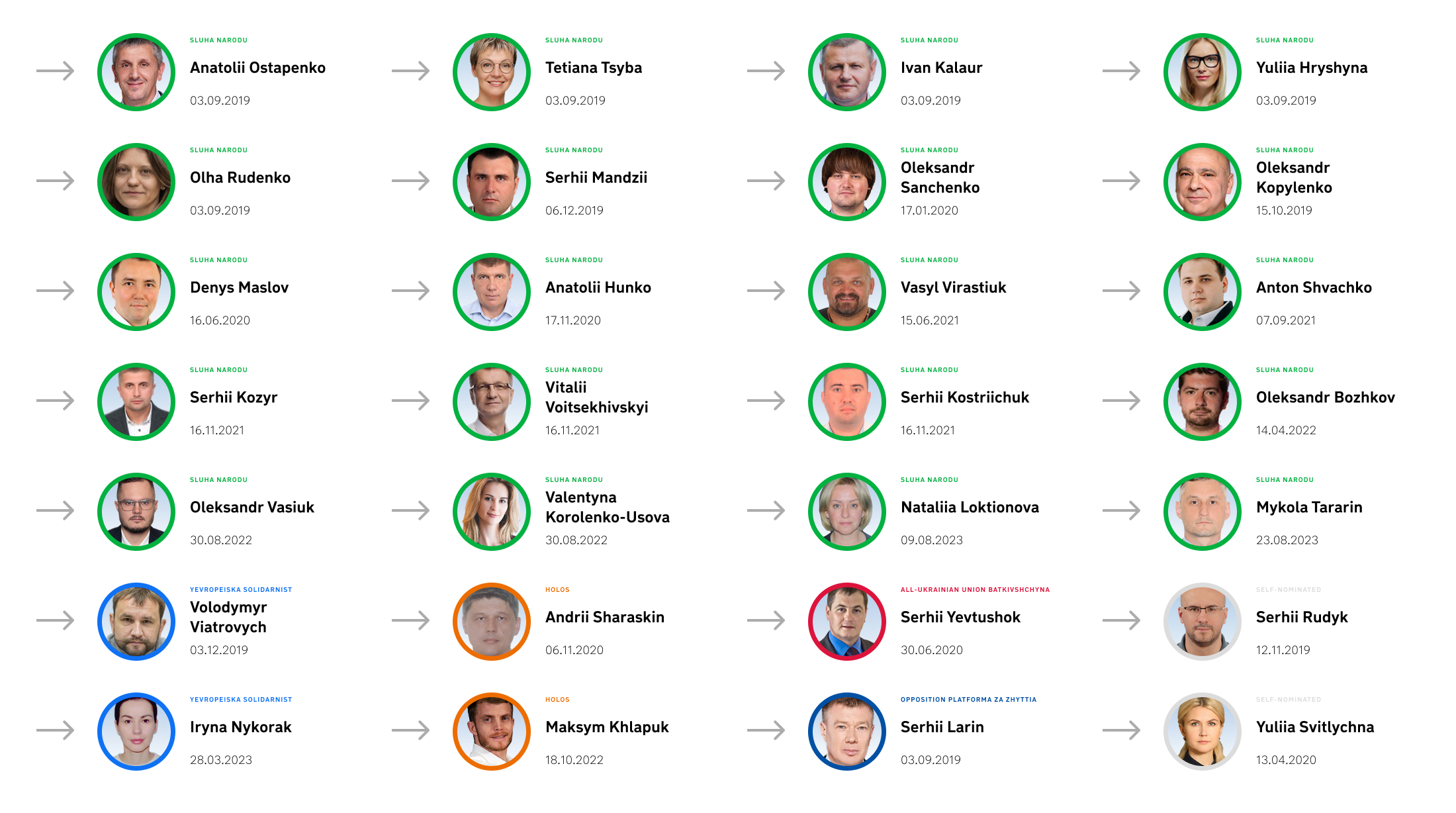
In June 2023, Vox Ukraine assessed the People's Deputies' Efficiency based on how each deputy’s votes for and against reforms. The top 3 deputies supporting reforms are Oleksandr Vasiuk, Valentyna Korolenko-Usova and Oleksandr Bozhkov, who took office in 2022. They scored between 97 and 100% in terms of efficiency, but only two voting sessions were taken into account after these deputies took the oath of office.
The leaders of the anti-rating remain unchanged throughout all sessions of the Parliament: Andrii Kozhemiakin ( Batkivshchyna), Serhii Lovochkin (Opposition Platform for Life), Oleksandr Ponomarov (Opposition Platforma za zhyttia), Fedir Khrystenko (ex-Opposition Platforma za zhyttia, now unaffiliated), Stepan Ivakhiv (Za Maibutnie) and Vadym Stolar (Vidnovlennia Ukraiiny) — the efficiency is less than 10%.
Among those who received a mandate after 2019 is Anatolii Hunko (formerly Sluha Narodu, now unaffiliated), who the NABU and the SAPO caught on bribery in August 2023. On October 18, the deputy was granted bail of UAH 10 million, so Hunko continues to attend meetings. On November 8, he took part in the voting.
Who else remains in the Rada despite suspicions and criminal proceedings?
Hunko is not the only one involved in criminal proceedings. As of the end of October 2023, according to the Agency for Legislative Initiatives, criminal cases were opened against 15 deputies. Most of those involved in high-profile scandals remain in office.
According to the State Bureau of Investigation and the Security Service of Ukraine, Oleksandr Dubinskyi forged documents to travel abroad during martial law. He stated that he was to accompany his father for medical treatment. In fact, he went on holiday to Italy, Croatia and Spain. On November 13, the SSU and the State Bureau of Investigation notified him of suspicion of high treason. The Pechersk Court of Kyiv placed him under arrest without bail.
Oleksandr Ponomarov (Opposition Platforma za zhyttia) and Nestor Shufrych (Opposition Platforma za zhyttia) are suspected under the same article. Both are in custody.
Bohdan Torokhtii, like Dubinskyi, went on holiday abroad. Bihus.info journalists used the social media accounts of Torokhtii's wife, Alina Levchenko, to reveal that during the full-scale war, the couple managed to visit Greece, Turkey, Qatar and the UAE. In August 2022, the wife purchased an apartment and premises in a resort town in Bulgaria and, a few months later, an apartment in Pechersk in Kyiv.
Unlike Yurii Aristov, who was exposed on a trip to the Maldives and resigned his mandate, Dubinskyi and Torokhtii remain in the Verkhovna Rada. They are now non-factional, as they were expelled from the Sluha Narodu party: Dubinsky in 2021 and Torokhtii in 2023, respectively. Mykola Tyshchenko remains in the Rada as a non-factional member after his trip to Thailand.
Pavlo Khalimon is still a member of the faction. Ukrainska Pravda media discovered that his common-law wife bought an estate in the Pechersk Hills five to six times cheaper than the market price. The NACP found signs of illicit enrichment of UAH 10 million.
Liudmyla Marchenko remains in the Sluha Narodu party, although Davyd Arakhamiіa announced her expulsion in July.
Marchenko and her assistant entered the data of men of military age into the Shliakh system for bribes so that they could travel abroad. In a video published by the National Anti-Corruption Bureau, Marchenko is seen throwing money behind a fence before detectives arrive.
In September, the High Anti-Corruption Court granted the deputy bail of UAH 53,600. According to the Verkhovna Rada website, Liudmyla Marchenko has not attended any meetings since being notified of the suspicion.
The National Anti-Corruption Bureau has put Yaroslav Dubnevych (Za Maibutnie) on the international wanted list. Dubnevych is suspected of embezzling natural gas worth over UAH 2.1 billion and is a defendant in the case of embezzlement of UAH 93 million from Ukrzaliznytsia. On November 13, he was detained by the High Anti-Corruption Court.
Similarly, Serhii Shakhov (Dovira group) is also on the wanted list, accused of failing to declare property worth UAH 88 million.
The current co-chair of the Yevropeiska Solidarnist faction, Artur Herasymov, also had problems with his declaration. In August 2023, the High Anti-Corruption Court found him guilty of failing to declare his estate in Spain in 2020. Herasymov escaped punishment due to the expiration of the statute of limitations.
According to investigators, Serhii Alieksieiev (Yevropeiska Solidarnist) promised a German citizen he would overturn the extradition order in court for $50,000 through his connections. The Prosecutor General's Office classifies this as fraud, as Alieksieiev "took advantage of the foreigner's lack of knowledge of Ukrainian law". The People's Deputy was released on bail of UAH 2.26 million. He attends meetings of the Verkhovna Rada and takes part in voting.
The Office of the Prosecutor General opened criminal proceedings against Artem Dmytruk (Vidnovlennia Ukraiiny group, until 2021, he was a member of the Sluha Narodu) and Oleksandr Kunytskyi (Sluha Narodu) after they were involved in a fight in the centre of Kyiv on October 5, 2023. Both are now members of the Rada and take part in voting.
On November 3, 2023, Andrii Nikolaienko (Batkivshchyna) committed an accident on the Kyiv — Chop highway. An 18-year-old girl died on the spot from her injuries. The court placed the deputy under round-the-clock house arrest.
In March of this year, Volodymyr Hevko (Sluha Narodu) was also involved in a road accident, killing one person. There was no court verdict, and Hevko has remained a regular attendee of the Verkhovna Rada and voted for laws.
November 21, 2023, was the tenth year since Euromaidan began. Anti-corruption agencies called this day "The Day of the Big Exposures". People's deputies from the Sluha Narodu party, Andrii Odarchenko, and the Za Maibutnie party, Serhii Labaziuk, tried to bribe Oleksandr Kubrakov, Minister of Community Development, Territories and Infrastructure, and Mustafa Naiem, head of the State Agency for Infrastructure Restoration and Development — the same Mustafa Naiem who called on people to come to Maidan in 2013.
Kubrakov and Naiem cooperated with anti-corruption authorities: People's Deputy Odarchenko was imposed a preventive measure in the form of detention, but he was released on bail of UAH 15 million; Labaziuk was imposed two months of arrest but was released on bail of UAH 40 million.
During the court hearing against Odarchenko, the SAPO prosecutor read out several of his quotes. The People's Deputy says that he has his cryptocurrency exchanges (it was Odarchenko who was the first person to be found by anti-corruption authorities to have taken a bribe in cryptocurrency), says that at the beginning of the full-scale invasion he was in Zakarpattia, does not believe that "Kharkiv will survive", and asked himself "whether we (Ukraine — ed.) needed these Donetsk, Luhansk and Crimea".
The Sluha Narodu faction has suspended Andrii Odarchenko's membership in the party for the duration of the NABU investigation, the party's press service told Radio Liberty.


